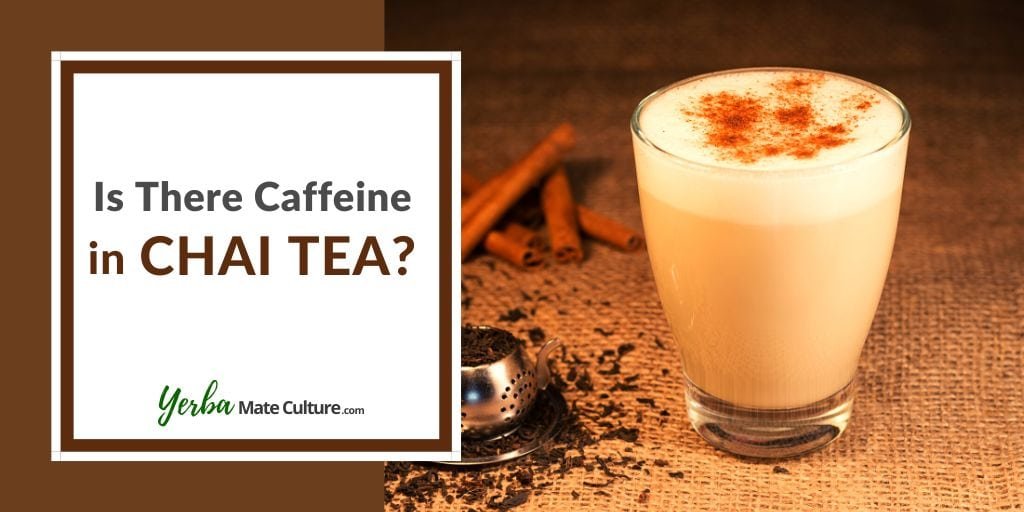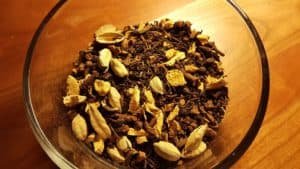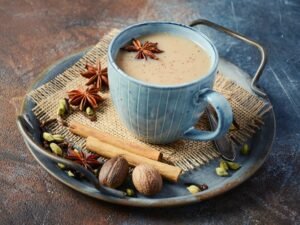Masala chai is a famous Indian tea drink known for its sweet, complex, and full-bodied taste. It has become so popular that most coffee shops now have it on their menus — or at least some version of it.
While the “chai lattes” and “iced chai lattes” you can order from Starbucks and Dunkin’ Donuts are not exactly the same as the traditional Indian version, they are delicious and energizing tea drinks full of nutrients and healthy antioxidants.
But does a chai latte or an original Indian chai contain any caffeine?
The simple answer is — yes, they do!
The caffeine comes from black tea used in brewing chai, and the amount of caffeine can vary greatly depending on how the drink was prepared.
To make things a bit more complicated, there are also versions of chai that only contain herbal ingredients and are caffeine-free.
In this guide, we will discuss the different versions of chai and how much caffeine they have. I will also tell you how to make a heavenly chai or iced chai latte at home.
So buckle up, hold on to your kulhar (a traditional clay cup for chai), and get ready to learn all about chai tea and caffeine!
If you just want to quickly compare the amount of caffeine in typical chai latte and masala chai to some other popular drinks, take a look at the infographic below:
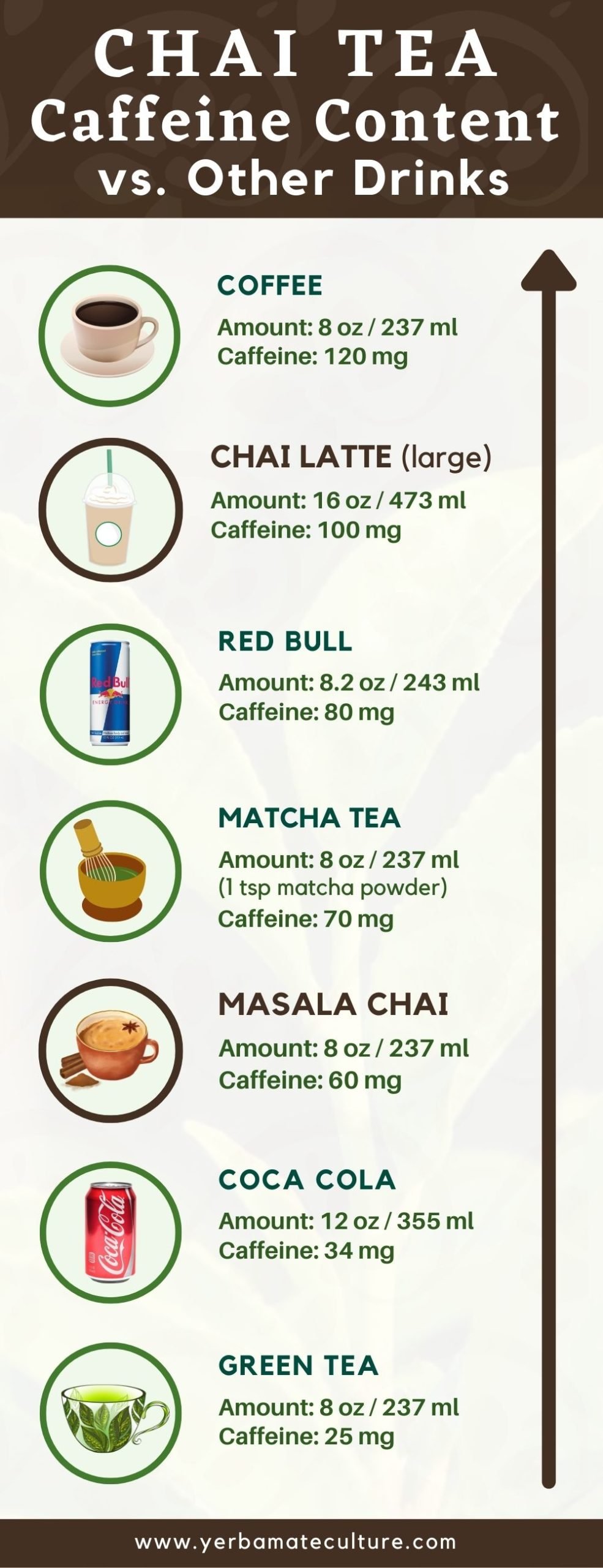
Note: the amounts in the infographic above are only estimates and can vary greatly depending on the ingredients and brewing method used.
Does Chai Tea Have Caffeine? How About Chai Latte?
Before we go into details about chai and caffeine, let’s take a quick look at what exactly is this delicious and healthy beverage made with.
What Exactly is Chai Tea?
The word “chai” actually means tea in India, and when we say chai in Western countries, it usually refers to masala chai, which translates to “mixed-spiced tea.”
This popular Indian beverage is typically made with the following components:
- Black Tea: Assam black tea, known for its high caffeine content, is the traditional choice for brewing chai.
- Herbs and Spices: Usually at least ginger, cloves, cardamom, and cinnamon are used.
- Milk: Chai is best made with full-fat cows milk, often used in a 1:1 ratio with water. There are also many excellent plant-based options like soy, cashew, almond, or coconut milk.
- Sweetener: This is optional, but chai is typically sweetened with sugar. You can also use honey or some other option like stevia.
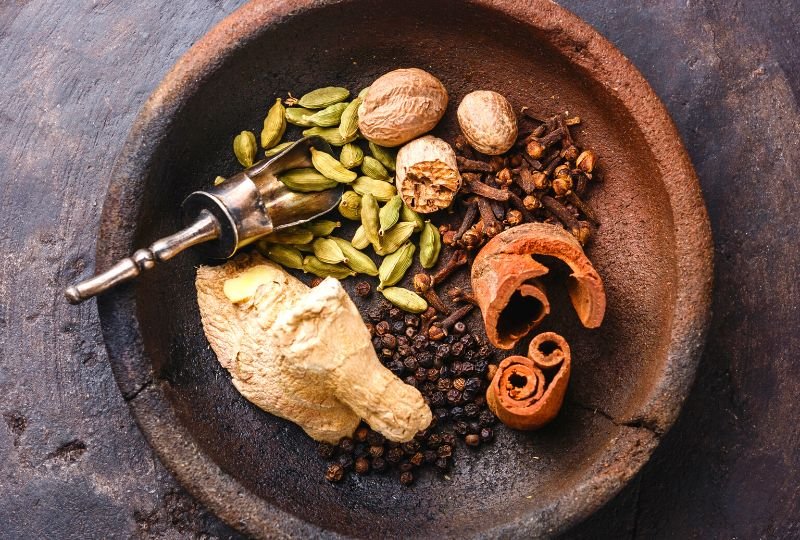
Yet, there are many versions of chai being served around the world. Some might be made with various types of black tea, green tea, or herbal ingredients like rooibos.
One great thing is that the benefits of chai tea are many, as it can help you with controlling hunger and losing weight, improve digestion and immunity as well as boost your energy levels and brain health.
Then what is chai latte all about?
This trendy tea drink can be found on the menus of most coffee shops and is great both hot and iced. It simply means black tea with spices that is served with foamed milk.
So there isn’t necessarily any real difference between traditional masala chai and chai latte except for the foamed milk.
The exact recipe for each drink varies depending on where you order it.
Chai Tea and Caffeine
The caffeine content of chai depends on the ingredients used to make it.
As mentioned earlier, the traditional Indian masala chai is made with Assam black tea, which is known for its high caffeine content. Thus, it also contains a hefty amount of caffeine.
If you are having chai made with some other type of black tea or green tea, it will probably contain less caffeine. And chai made with only herbal ingredients does not have any caffeine in it.
How Much Caffeine is in Chai Tea and Chai Latte?
As a rough estimate, we can say that an average cup of chai or chai latte contains about 60 to 100 milligrams of caffeine.
The exact amount of caffeine in your cup of chai mainly depends on the following factors:
- Type of Tea: What kind of tea was used to make the chai greatly affects its caffeine content. Assam tea is rich in caffeine, but there are also variations between different brands.
- Amount of Tea: The more tea is used per cup of chai, the stronger it will be.
- How it’s Brewed: Longer brewing time and higher water temperature results in more caffeine being dissolved into the water.
Chai Tea Caffeine vs Coffee
When you need an energy boost, a cup of coffee is one of the most common choices.
Iced and hot coffees are available anywhere from Starbucks and Mcdonald’s to old-school coffeehouses.
But will a chai latte or a cup of hot masala chai have a similarly uplifting effect?
When compared ounce-to-ounce, coffee is stronger — an average 8-ounce cup has about 120 milligrams of caffeine. But a large chai latte can have as much, or even more, punch in it.
Of course, this depends on the size of your drink and where you order it or how you brew it at home.
So let’s take a detailed look at the amount of caffeine in some popular chai drinks from different brands.
Does Starbucks Chai Latte Have Caffeine?
Yes, both Starbucks Chai Tea Latte and Iced Chai Tea Latte are made with black tea and have 95 milligrams of caffeine for the grande (16 oz) sized drink.
The venti-sized (24 oz) chai drinks have 145 milligrams of caffeine.
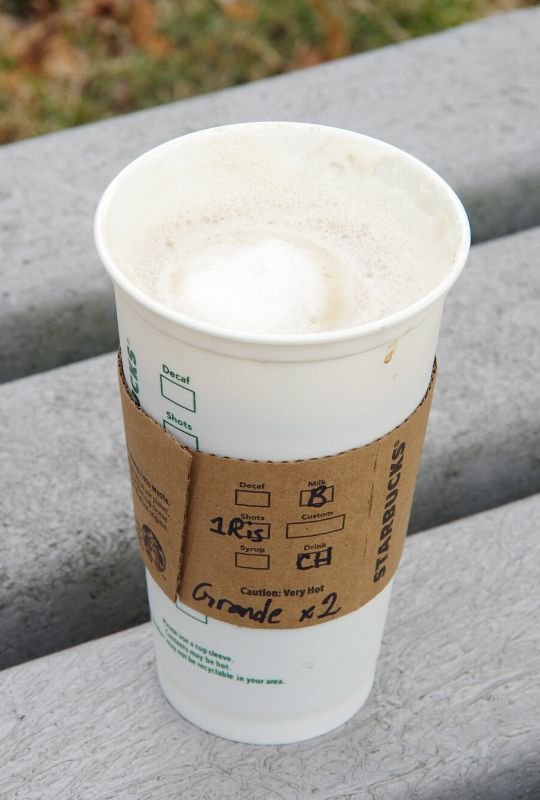
If you want even more caffeine, try ordering a “dirty chai” — a mix of coffee and tea. Just ask for a chai tea latte with an espresso shot added to it!
Does Dunkin’ Donuts Chai Latte Have Caffeine?
Yes, both Dunkin’ Chai Latte and Iced Chai Latte have 105 milligrams of caffeine for the medium (24 oz) sized drink.
If you order a large (32 oz) sized chai, it has 140 milligrams of caffeine.
Does Twinings Chai Tea Have Caffeine?
Yes, Twinings Chai teabags contain black tea and have caffeine, but there is no information available about the exact amount of caffeine.
There are also decaffeinated Twinings Chai teabags available.
Does Tazo Chai Tea Have Caffeine?
Tazo has at least two different chai products available, Tazo Organic Chai teabags and Tazo Classic Chai Latte concentrate.
The exact amount of caffeine in these products is not available. For the teabags, the amount of caffeine is listed as 3/5 (or 31-45 mg), and for the Chai Latte concentrate, it’s 5/5 (61+ mg).
How to Make Masala Chai or Iced Chai Latte at Home
Now I’m going to explain how you can make chai at home. It’s not very difficult, but you need some time and quite a few ingredients.
If you want to make things easier and faster, I also have a guide with the best Indian chai brands that will give you great results in minutes.
Ready to make everything from the beginning?
Here is my favorite chai tea recipe for six servings:
You will need the following equipment:
- Saucepan or tea pot
- Knife
List of ingredients:
- 3 cups water
- 3 cups whole milk (or plant-based milk)
- 5 tbsp loose leaf black tea (I prefer Assam tea)
- 1-inch piece of ginger (sliced)
- 10 cloves (whole)
- 15 green cardamom pods
- 1 1/2 cinnamon sticks (about 2 inches)
- 5 – 10 tsp teaspoons of brown sugar
Optional ingredients:
- 15 black peppercorns
- 5 star anises
- 1/2 tsp fennel seeds
How to prepare it:
- Crack the cardamom pods, cloves, and peppercorns (if you are using them) and put them in a saucepan or teapot. Add thinly sliced ginger, cinnamon sticks, and black tea. Add star anise and fennel seeds if you want to use them. Add the water.
- Bring to a low boil and cover. Steep on low heat for at least 10 minutes. If you want a stronger infusion, keep the chai on very low heat for an hour or two.
- Add milk and sugar. Stir it while heating until it’s simmering hot again. Simmer for a few minutes to allow the milk to bring out the oil from the spices.
- Pour into mugs or glasses through a strainer and enjoy!
So how about that iced chai latte?
I recommend you try the recipe above and make six servings of masala chai — but don’t drink all of it!
Save a part of it and let it cool down to room temperature, then put it in the refrigerator. The next day you can take a large glass, add a generous amount of ice, and pour the chai on top. Then you can also add some cold foamed milk.
And voilà, there you have it — an iced chai latte!
You might also want to try out some of the following modifications the next time:
- Use less water and more milk
- Add vanilla extract or use vanilla coffee syrup
- Adjust the amount of spices to suit your taste
Final Thoughts on Chai Tea Caffeine Content
Now you know all there is about chai and caffeine.
So next time you order a chai latte at a coffee shop or make one at home, you know how much caffeine it has.
This information is very useful because sometimes you just need a proper dose to wake you up in the morning or to keep you going after lunch. On the flip side, you might not want to consume a lot of caffeine late in the evening — especially if you are sensitive to it.
Enjoy your chai and feel refreshed!

